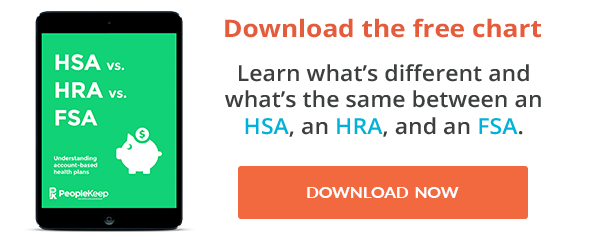Since health insurance costs are rising to the States States, many employers adopt new strategies to  provide their employers health benefits - in a sense being account-based health plans (ABHPs). Two common types are ABHPs reimbursement healthcare plans (HRPS) and health reimbursement arrangements (HRA). These types of health benefits of reducing the cost of health care without reducing coverage for employees.
provide their employers health benefits - in a sense being account-based health plans (ABHPs). Two common types are ABHPs reimbursement healthcare plans (HRPS) and health reimbursement arrangements (HRA). These types of health benefits of reducing the cost of health care without reducing coverage for employees.
And although both HRPS and CRH are commonly used by employers, many employers do not know what is the difference between each plan. To help clear up any confusion, we have set up a table to show you a side by side comparison.
HRP and HRA Definitions
HRP: HRPS are financed by the employer, diets employer health benefits tax benefits used to pay eligible employees for individual health insurance premiums and preventive care. HRPS are specifically designed to meet the new affordable rules and regulations of the Care Act. HRPS are a type of full replacement ABHPs. This approach is also called a "pure" defined contribution plan or a health plan premium refund
HRA :. CRH are funded employer plans to employer health benefits used to reimburse employees for tax efficient eligible medical expenses. With an "integrated HRA", the HRA is paired with a deductible high health insurance plan to reimburse employees for their deductible expenses. With a "Stand-alone HRA", the HRA is a ABHP total replacement and is used to reimburse employees eligible individual health insurance premiums and medical expenses.
from 2014, however, the health reform has placed limits on the use of autonomous HRAs for most employers. CRH autonomous types that comply under the health reform include retired and CRH CRH single autonomous person.
HRP vs. HRA Side-by-Side Comparison
to help you understand the and differences between HRP and HRA, we have developed a table. You will see that, like many ABHPs many characteristics and requirements are similar.
| health repayment Plan (HRP) | health arrangement repayment (HRA) | |
| can contribute | Employer only. | Employer only. |
| Cost of employer contributions | Pay only for employee use (typically 25-50%). | Pay only for employee use (usually 25-50%) |
| Maximum annual contribution | determined by the employer. no legal limit | Determined by the employer. no legal limit. |
| Tax Treatment | Tax-free. | Tax-free. |
| Eligibility | All employees and former employees as determined by the employer, not self-employed. | All employees and former employees as determined by the employer, not self-employed. |
| insurance Purchase of compulsory health? | No. Employer may require proof of health insurance to qualify for HRP. | No. Employer may require participation in the group of the company health insurance plan to qualify for the HRA. |
| authorized medical costs | unreimbursed medical expenses of care as defined by IRC 213 (d); including health insurance premiums. To comply with the Act on the Affordable Care HRPS are designed to allow only the reimbursement of eligible Medicare premiums and basic prevention services | unreimbursed medical expenses as defined by IRC 213 (d). including health insurance premiums. Employer may limit the categories of expenditure IRS approved. Eligible expenses set out in the documents plan. |
| funds carried over to the next year? | No | determined by the employer. |
| administrator | Employer or third party administrator (TPA). | Employer or third party administrator (TPA). |
| After termination Portable | determined by the employer. | determined by the employer. |
Conclusion
Know and understand the differences between HRPS and CRH is important. Why? With various health benefits of the options available for your small business, it is advantageous to compare side by side what will work best for you and your employees.
Do not miss these useful items
CRH in 2015 - What all employers must know
Healthcare repayment plan (HRP) - what
what questions do you have about CRH or HRPS? Leave your comment below.


I often read your blogs. I appreciate your article and I really like them. Health Insurance Agent is a well-known name in the US for the best and cheap health insurance plans . Keep sharing such blogs.
BalasHapus